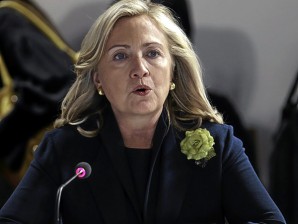Clinton declares ‘Participation Age’ for women
SAN FRANCISCO — US Secretary of State Hillary Clinton urged greater efforts Friday to break barriers for working women, saying the world has entered a “Participation Age” where inclusion means economic growth.

PITCH FOR WOMEN. Secretary of State Hillary Rodham Clinton speaks during the Asia-Pacific Economic Cooperation (APEC) Women and the Economy Summit meeting in San Francisco, Friday, Sept. 16, 2011. AP
Clinton, who has made women’s rights a top priority throughout her career, made an impassioned call as she led a special meeting of the 21-member APEC Asia-Pacific bloc dedicated to the role of women in the economy.
Pointing to the anemic growth and debt woes afflicting many major economies, Clinton described women as a great untapped resource.
Women, she said, tend to save better and can provide new markets when they are empowered.
“The transformational nature of the undertaking that lies ahead is, in my view, not unlike other momentous shifts in the economic history of our world,” Clinton told an overflow crowd of business leaders and diplomats from across the Pacific Rim gathered in San Francisco.
“I believe that here, at the beginning of the 21st century, we are entering the Participation Age, where every individual, regardless of gender or other characteristics, is poised to be a contributing and valued member of the global marketplace.
Article continues after this advertisement“When it comes to the enormous challenge of our time – to systematically and relentlessly pursue more economic opportunity in our lands — we don’t have a person to waste. And we certainly don’t have a gender to waste,” she said.
Article continues after this advertisementClinton, citing studies, said that narrowing the gender gap could lead to a 14 percent rise in per capita incomes by 2020 in APEC economies, including China, Indonesia, the Philippines, Russia, South Korea and Vietnam.
“When we liberate the economic potential of women, we elevate the economic performance of communities, nations and the world,” Clinton said.
She noted that governments routinely took measures of indicators such as macroeconomic growth, unemployment and debt.
“Shouldn’t we be at least as attentive to collecting, analyzing and publicizing the facts as we seek to move women into the mainstream of economic life in our nations?” the top US diplomat asked.
Clinton, along with Australian Foreign Minister Kevin Rudd and Indonesian Foreign Minister Marty Natalegawa, later led a special APEC meeting that agreed on a declaration on increasing the role of women.
“In 2011 and beyond, APEC economies will take concrete actions to realize the full potential of women, integrate them more fully into APEC economies, harness their talents, remove barriers that restrict women’s full economic participation, and maximize their contributions towards economic growth,” it said.
They vowed to focus on improving women’s access to capital and markets as well as to education and training; and they vowed to focus on increasing the number of women in leadership roles in both the private and public sectors.
APEC, or the Asia-Pacific Economic Cooperation forum, accounts for more than half of global GDP and includes the world’s three largest economies — the United States, China and Japan.
The United States chairs APEC this year and will play host to a summit in November in Hawaii.
Clinton, who lost a bid for the Democratic presidential nomination in 2008 to Barack Obama, acknowledged that the APEC declaration would not bring changes in itself.
“It requires, rather, a fundamental transformation — a paradigm shift in how governments make and enforce laws and policies, how businesses invest and operate, how people make choices in the marketplace,” she said.
Clinton credited a number of businesses in the APEC region for taking action to include women.
She praised Wal-Mart for recently announcing that it would double the amount of goods it will buy from women-owned businesses globally to $20 billion by 2016.
The retailing giant has long been controversial for its labor practices, but Clinton has longstanding ties with Wal-Mart from her time as first lady of Arkansas.
As the US first lady, Clinton delivered a landmark speech to a UN conference in Beijing in 1995 in which she declared that women’s rights are human rights.